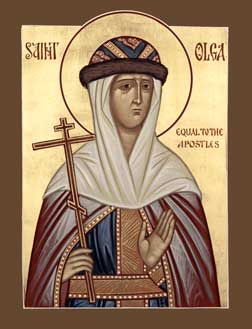Olga din Kiev
| Acest articol (sau părți din el) este propus spre traducere din limba engleză!
Dacă doriți să vă asumați acestă traducere (parțial sau integral), anunțați acest lucru pe pagina de discuții a articolului. |
Sfânta și dreapta prințesă Olga din Kiev (890 - † 969) a fost bunica prințului Vladimir din Kiev. Ea a fost prima între conducătorii poporului rus care s-a convertit la creștinismul ortodox, la Constantinopol în anul 957; sub influența ei nepotul Vladimir s-a convertit și el la creștinism și a adus Ortodoxia în Rusia. Prăznuirea ei în Biserica Ortodoxă se face la 11 iulie.
Viața
Olga's origins are not certain. Although she may have come from Pskov, according to the Russian Primary Chronicles, she came from Vyshgorod. She was probably of Varangian heritage. She is believed to have been born about 890. About 903 she married Prince Igor I, who was the son of the founder of Russia, Rurik. Prince Igor succeeded his father Oleg as the ruler of Kiev and its territories, which now constitute parts of a number of present day nations: Russia, Ukraine, Belarus, and Poland.
After her husband Igor was murdered in 945, Princess Olga became the regent for her son, Svyatoslav, until he came of age in 964. She is remembered in the Primary Chronicles for her revenge against the Derevlyanins for the murder of her husband. In a tough world the Princess Olga could be tough. She was known as a strong and effective ruler. When she became interested in Christianity is uncertain, although her interest may have started before her visit to Constantinople.
In 957, she visited Emperor Constantine VII in Constantinople. He admired her looks and intelligence, noting to her that 'You are fit to reign in this city with us.' She agreed to be baptized and thus became a Christian, with name Helen, after the Patriarch Polyeuctus had instructed her in the faith. Before her baptism, Constantine asked her hand in marriage, but Olga deferred claiming that she wanted to be baptised an Orthodox Christian first. Again, after the baptism, Constantine requested her hand in marriage, but the quick-thinking Olga tricked him (since he was her godfather in baptism), noting that he called her his daughter in baptism and so such a union is forbidden under Christian law. While Constantine commented to Olga about her trickery, he lavished gifts on her when she returned to Kiev. In Kiev she instructed her son, Svyatoslav, and entreated him to be baptized. While he could not bring himself to commit to baptism, he would not forbid others.
In 968, while Svyatoslav was occupied elsewhere, Pechenegs surrounded Kiev in a siege where Olga was living, caring for her grandsons Yaropolk, Oleg, and Vladimir. As the people became weaker with hunger and lack of water, Olga inspired a lad to escape the siege and bring relief. By this time sickness had come upon the aging Princess Olga. At the same time her son wanted to move his residence to Pereyaslav (which is on the Danube River), leaving Olga in Kiev. Olga restrained Svyatoslav from leaving until after she had died. She died on July 11, 969 and was buried by a priest, having ordered that there would not be a funeral feast.
Moșternirea
While Olga was not successful in converting her son or many others to the Christian faith, her example may have been a great influence on her grandson, Vladimir, who in 988 became an Orthodox Christian and led the inhabitants of Kiev and Rus' to follow him in the Baptism of Rus'. For her leadership in bringing Christianity to Russia, she is considered the first saint of the Russian Orthodox Church.
Imnografie
Tropar (Glas 1)
- Giving your mind the wings of divine understanding,
- you soared above visible creation seeking God the Creator of all.
- When you had found Him, you received rebirth through baptism.
- As one who enjoys the Tree of Life,
- You remain eternally incorrupt, ever-glorious Olga.
Kontakion (Tone 4
- Today let us praise God the Benefactor of all,
- Who glorified divinely-wise Olga,
- That through her prayers, He may grant our souls remission of sins.
Surse
- Ed. Tessa Clark, The Russian Chronicles, Thunder Bay Press, 2001 ISBN 1-57145-577-9
Legături externe
| Olga din Kiev | ||
|---|---|---|
| Precedat de: Igor |
Prințesă de Kiev 945-962 |
Urmat de: Sviatoslav I |
